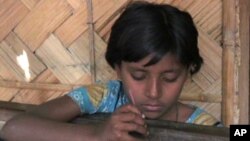June 12 marks the World Day Against Child Labor sponsored by the International Labor Organization. The annual occasion is meant to draw policy attention to the more than 200 million children around the world who work full time, many in sweatshop conditions. But not all child labor situations are black and white cases of exploitation. Some underage textile workers in India are often crucial to their families' economic survival.
In the predominantly Muslim village of Rashkali, about 50 kilometers south of Kolkata, this is how many children spend much of their lives.
They are workers in the industry of zari - decoratively embroidered textile products, aimed mainly at export markets.
Bead by bead, tiny hands painstakingly stitch the ornate fabric. Nearly half of the town's work force is made up of children between eight and 15 years old. Some of them begin learning to use the needle as early as four or five years old.
"On school days I work for four to five hours usually. I work for 12-14 hours the day I don't go to school. I enjoy doing zari work. My father cannot earn enough, because he is sick. When I turn 19 or 20 years old, my parents will use the money I earn to marry me off to a husband."
Zari production in this town is often home-based, and children often work alongside family members. The conditions are not as harsh as those encountered in India's dense urban centers, nor as dangerous as those faced by children in industries like mining for precious metals. But grinding poverty and limited opportunities have forced many of these young people to grow up much faster than they normally would, taking their place among child laborers which number, according to various estimates, between 20 and 50 million in India.
"I left school to work. My brother is at the top of his class and he wants to become an engineer," said one young zari worker. "But we may not be able to keep him in school that much longer. Now he works for three to four hours with us every day when he is in school. On days he is not in school, he works for 15 to 16 hours."
"My father is dead. The family depends on my mother's work. So I have to help my mother in her zari work every day for three to four hours. But I also love to study," said Ashique, 8.
Tedious hours of zari production rob many children of time they might better spend studying, or simply playing and enjoying their youth. But many families simply see no other choice.
"I am blind and unable to work. We are very poor. My daughter-in-law is doing zari work to support the family. Every day my grandson has to work for three to four hours to support his mother. It's affecting his schoolwork. We have no other way. I feel very sad," said the head of one household.
The United States and other Western countries have sought to tailor their import policies to refuse the products of child labor like the zari textiles produced in Rashkali. Such steps may cause pain, at least in the short run, for families dependent on the measure of economic security produced by the zari work of its youngest members.
